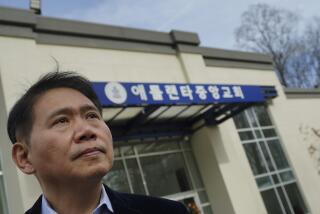2 Missionaries Guilty in Fatal Exorcism Case
- Share via
Ruling that two Korean Christian missionaries who performed a deadly exorcism were trying to heal, not harm, a judge cleared them of murder charges Wednesday in a case experts called a potential landmark in California criminal law.
Ending a three-week trial in Malibu that he said raised “novel and significant issues,” of religion and culture, Superior Court Judge James A. Albracht found Jae-Whoa Chung, 50, and Sung Soo Choi, 47, guilty of involuntary manslaughter in the stomping death of Chung’s wife during a demon-cleansing ritual.
Her body was covered with bruises and abrasions. According to testimony, 16 ribs were broken, the muscles in her thighs were so damaged the tissue had died, her internal organs were displaced and crushed, and a vein leading to her heart was torn. Chung and Choi have been jailed since their arrests July 4 for the murder of 53-year-old Kyung-Ja Chung. They face no more than four years in state prison; had they been convicted of second-degree murder they would have faced 15 years to life.
Declaring victory, defense attorneys said they will ask Albracht to release their clients on probation when they return to court next week for sentencing.
Meanwhile, Deputy Dist. Atty. Hank Goldberg said outside the courtroom that he was satisfied with winning a conviction--and with the judge’s recognition that Chung’s was an unlawful killing.
The prosecutor had argued vigorously for second-degree murder convictions, contending that the men showed a conscious disregard for the woman’s life.
Legal analysts called Albracht’s ruling bold given the disfavor with which religious and cultural defenses have been viewed during the past decade. Opinions differed, however, on the potential impact of the decision.
“This case pushed the envelope and may be seen as a landmark case,” said Laurie Levenson, a dean at Loyola law school. “I do expect the ruling in this case will prompt other defendants to raise similar defenses. But I don’t think the courts will want to open the door for defendants to claim that their cultural background led them to beat a woman to death.”
Peter Arenella, a UCLA law professor, said cultural and religious defenses are bound to fail in court unless they specifically address a key concern of homicide laws--the defendant’s state of mind.
In fact, Arenella believes, not allowing evidence of cultural norms and religious practices could provide grounds for a higher court to overturn any murder conviction.
Attorneys and legal analysts agreed that Albracht bucked the current legal trend by recognizing the cultural and religious strains in the case, even welcoming testimony from a cultural anthropologist who appeared as an expert witness for the defense.
Despite a horrifying outcome, Albracht found, the missionaries had acted with the best of intentions. Their religious zeal led them to repeatedly crush Chung’s abdomen and chest with their hands and feet--conduct that was reckless but not malicious, the judge determined.
Calling the case “a tragedy of Shakespearean magnitude,” Albracht found the men may have been misguided and blinded by their religious zeal, but were focused on “saving her from the demons they believed possessed her.”
Chung seemed stunned by the verdict, but later managed a smile for his attorneys, Robert Sheahen and Christopher Lee.
Choi, handcuffed to his seat, fished for a handkerchief with his free hand and wiped tears from his eyes.
The Chungs’ son and daughter, ages 16 and 18, seemed relieved that their father had not been convicted of murder.
More to Read
Sign up for Essential California
The most important California stories and recommendations in your inbox every morning.
You may occasionally receive promotional content from the Los Angeles Times.



![Vista, California-Apri 2, 2025-Hours after undergoing dental surgery a 9-year-old girl was found unresponsive in her home, officials are investigating what caused her death. On March 18, Silvanna Moreno was placed under anesthesia for a dental surgery at Dreamtime Dentistry, a dental facility that "strive[s] to be the premier office for sedation dentistry in Vitsa, CA. (Google Maps)](https://ca-times.brightspotcdn.com/dims4/default/07a58b2/2147483647/strip/true/crop/2016x1344+29+0/resize/840x560!/quality/75/?url=https%3A%2F%2Fcalifornia-times-brightspot.s3.amazonaws.com%2F78%2Ffd%2F9bbf9b62489fa209f9c67df2e472%2Fla-me-dreamtime-dentist-01.jpg)








